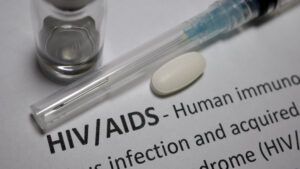
BMC Public Health – Feasibility and acceptability of peer-delivered HIV self-testing and PrEP for young women in Kampala, Uganda

This pilot study in Uganda aimed to assess the feasibility and acceptability of peer-delivered HIV self-tests (HIVST) and oral pre-exposure prophylaxis (PrEP) to young women with suboptimal PrEP adherence. Despite adolescent girls and young women (AGYW) accounting for a disproportionate 29% of new HIV infections in Uganda, this group remains underrepresented in the population. The study involved 30 young women aged 18–24 with suboptimal PrEP adherence. Peer-delivered interventions were well-received, with high completion rates at three and six months. Furthermore, qualitative analysis revealed positive experiences and motivation through peer support, emphasizing the importance of peer support in adherence to PrEP. The study concludes that peer delivery of these interventions is both feasible and acceptable, suggesting potential effectiveness in addressing HIV prevention challenges among African AGYW. Future controlled studies are recommended to further evaluate effectiveness on a wider scale.
BMC Infectious Diseases – Comprehensive knowledge about HIV/AIDS and associated factors among adolescent girls in Rwanda: a nationwide cross-sectional study

In this study researchers investigated the factors influencing comprehensive knowledge of HIV/AIDS among adolescent girls in Rwanda using data from the 2020 Rwanda Demographic and Health Survey. They found that of the 3258 participants, 53.6% demonstrated comprehensive HIV knowledge. Those with secondary education, health insurance, a mobile phone, exposure to television, and a history of HIV testing had where more likely to have a comprehensive knowledge of HIV/AIDS. Conversely, girls in Kigali and Northern regions, as well as those practicing the Anglican religion, had lower odds. The findings of this study highlight the importance of expanding HIV preventive education through education and social media. Continued involvement of decision-makers and community actors, particularly religious leaders, is crucial for enhancing comprehensive understanding of HIV/AIDS among adolescent girls.
BMC Primary Care – Determinants of access to general practice in a shared care model for people living with HIV: a qualitive study of patients’ perspectives in an Australian rural community

This study investigates the challenges and facilitators of implementing shared care models for people living with HIV in rural Australia. With improved HIV management, the aging HIV population faces comorbidities, necessitating coordinated care between general practitioners and specialists. However, those in rural areas experience barriers to accessing shared care. Thirteen qualitative interviews revealed that accessibility to general practice significantly influenced shared care engagement, moreover, participants doubted the additive value of general practitioners. Healthcare beliefs, stigma, and preferences for specialist care further impacted the use of shared care. The authors of the study found continuity of care in general practice helped facilitated shared care, however, logistical issues such as affordability and transport posed challenges. They concluded that overcoming patient priorities, anticipated stigma, and resource limitations in rural healthcare is crucial for effective shared care. Building rapport with general practitioners and ensuring continuity of care are essential strategies for quality primary care in shared models, supported by specialist physicians.
BMC Immunology – HIV specific Th1 responses are altered in Ugandans with HIV and Schistosoma mansoni coinfection

In fishing communities near Lake Victoria in Uganda, where HIV prevalence is high, Schistosoma mansoni (S. mansoni) infection rates are also significant. More than 50% of local fishermen are infected with S. mansoni. The authors of this study investigated how S. mansoni coinfection might modify immune responses against HIV. Using polychromatic flow cytometry and Gran-ToxiLux assays, the study compared HIV-specific responses, T cell phenotypes, and antibody-dependent cell-mediated cytotoxic (ADCC) potency and titres between individuals with HIV-S. mansoni coinfection and those with HIV alone. Interestingly, the findings revealed that S. mansoni coinfection was associated with modified anti-HIV responses, including a lower frequency of bifunctional CD4 T cells, higher overall CD4 T cell activation, and lower HIV ADCC antibody titres compared to individuals with HIV alone. The results suggest that S. mansoni infection affects T cell and antibody responses to HIV in coinfected individuals, highlighting the importance of understanding the impact of S. mansoni treatment upon HIV-specific immune responses and disease progression.
BMC Health Services Research – Comprehensive knowledge about HIV/AIDS and associated factors among adolescent girls in Rwanda: a nationwide cross-sectional study

The authors of this mixed-methods study investigated the attitudes, facilitators, and barriers to HIV drug resistance mutations (DRM) testing among pregnant women and children on antiretroviral therapy (ART) in Kenya. Despite lower rates of viral suppression in this population, the significance of DRM in treatment decisions is recognized, leading to the scaling up of national DRM testing programs in resource-limited settings. They conducted interviews with adolescents, caregivers, pregnant women, providers, and policymakers in five HIV treatment facilities. Results from the interviews highlighted the value of DRM testing in clinical decision-making and patient reassurance, with a desire among providers and policymakers for a streamlined, potentially decentralized testing process with greater patient and provider “empowerment” to increase comfort with testing protocols. The study highlights the potential of DRM testing to improve patient health outcomes and emphasizes the need for simplified and efficient implementation strategies.
Call for Papers!
The BMC Series is passionate about furthering research in HIV/AIDS and has a few Collections open which researchers may be interested in submitting their valuable HIV/AIDS research too:
- HIV care at BMC Health Services Research
- HIV long-acting treatments: prophylactic and therapeutic at BMC Infectious Diseases
- COVID-19 and HIV at BMC Infectious Diseases
Comments